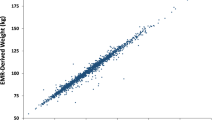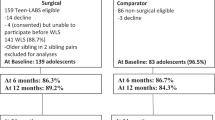Abstract
OBJECTIVE: To examine patients' reports of the level of care that they receive from their physicians, and determine the influence of weight and gender in these reports.
DESIGN: In a four-cell design, male and female, overweight and nonoverweight patients reported on the medical care that they received immediately following their appointment.
SUBJECTS: A total of 125 patients affiliated to one of four large clinics in the Texas Medical Center of Houston completed this study.
MEASUREMENTS: Patients reported the positivity of the care that they received, the time that physicians spent with them, and the extent to which physicians discussed weight-related topics with them.
RESULTS: Overweight patients, as a whole, did not report poorer levels of care than did their thinner counterparts. Rather, the weight and gender of the patient significantly interacted across each of the measures to reveal some divergence between male and female patients' weight-based experiences. When significant differences in reported perceptions emerged, overweight men reported deficits in care relative to average weight men (eg, physicians spent less time), whereas overweight women reported enhanced care relative to average weight women (eg, better levels of care, more topics discussed).
CONCLUSION: Based on patients' reports, this study reveals that physician care may not be as influenced by patient weight as previously thought. Yet, there is a discernable impact of patients' weight on physician behavior. Overweight men, who may comprise the most at-risk population, indicate that less time is spent with them than that indicated by average weight men. While this may be alarming, overweight women do not report reductions in care. We propose that not only might physicians respond to them differently, but overweight female patients may also be engaging in denial strategies or compensatory behaviors that assure them of quality care.
This is a preview of subscription content, access via your institution
Access options
Subscribe to this journal
Receive 12 print issues and online access
$259.00 per year
only $21.58 per issue
Buy this article
- Purchase on Springer Link
- Instant access to full article PDF
Prices may be subject to local taxes which are calculated during checkout


Similar content being viewed by others
References
Seidell JC . Societal and personal costs of obesity. Exp Clin Endocrinol Diabetes 1998; 106 (Suppl 2): 7–9.
Allison DB, Fontaine KR, Manson JE, Stevens J, VanItallie TB . Annual deaths attributable to obesity in the United States. JAMA 1999; 282: 1530–1538.
Pi-Sunyer FX . Health implications of overweight. Am J Clin Nutr 1991; 53: 1595S–1603S.
Allon N . The stigma of overweight in everyday life. In: Wolman BB, DeBerry S (eds). Psychological aspects of overweight: a handbook. Van Nostrand Reinhold: NY; 1982. pp 130–174.
Baumeister RF, Leary MR . The need to belong: desire for interpersonal attachment as a fundamental human motivation. Psychol Bull 1995; 117: 497–529.
Myers A, Rosen JC . Obesity stigmatization and coping: relation to mental health symptoms, body image, and self-esteem. Int J Obes Relat Metab Disord 1999; 23: 221–230.
Jung RT . Obesity as a disease. Br Med Bull 1997; 53: 307–321.
Pingitore R, Dugoni BL, Tindale RS, Spring B . Bias against overweight job applicants in a simulated employment interview. J Appl Psychol 1994; 79: 909–917.
Uchino BN, Cacioppo JT, Kiecolot-Glaser JK . The relationship between social support and physiological processes: a review with emphasis on underlying mechanisms and implications for health. Psychol Bull 1996; 119: 488–531.
Weiner B . Judgments of responsibility: a theory of social conduct. The Guilford Press: NY; 1995.
Pérusse L, Chagnon YC, Weisnagel J, Bouchard C . The human obesity gene map: the 1998 update. Obes Res 1999; 71: 111–129.
Sorensen TI, Holst C, Stunkard AJ . Adoption study of environmental modifications of the genetic influences on obesity. Int J Obes Relat Metab Disord 1998; 22: 73–81.
Kaminsky J, Gadaleta D . A study of discrimination within the medical community as viewed by obese patients. Obes Surg 2002; 12: 14–18.
Puhl R, Brownell KD . Bias, discrimination, and obesity. Obes Res 2001; 9: 788–805.
Price JH, Desmond SM, Krol RA, Snyder FF, O'Connell JK . Family practice physicians' beliefs, attitudes, and practices regarding overweight. Am J Prev Med 1987; 3: 339–345.
Price JH, Desmond SM, Ruppert ES, Stelzer CM . Pediatricians' perceptions and practice regarding childhood overweight. Am J Prev Med 1989; 5: 95–103.
DeJong W . The stigma of obesity: the consequences of naive assumptions concerning the causes of physical deviance. J Health Soc Behav 1980; 21: 75–87.
Young LM, Powell B . The effects of overweight on the clinical judgments of mental health professionals. J Health Soc Behav 1985;26:233–246.
Teachman BA, Brownell KD . Implicit anti-fat bias among health professionals: is anyone immune? Int J Obes Relat Metab Dis 2001; 25: 1525.
Gallagher SM . Meeting the needs of the obese patient. Am J Nurs 1996; 96: 1s–12s.
Gallagher SM . Caring for obese patients. Nursing 1998; 43: 32hn1–32hn3.
Blumberg P, Mellis LP . Medical students' attitudes toward the obese and the morbidly obese. Int J Eat Dis 1985;4:169–175.
Bretytspraak LM, McGee J, Conger JC, Whatley JL, Moore JT . Sensitizing medical students to impression formation processes in the patient interview. J Med Educ 1977; 52: 47–54.
Robin TI . Alive and fat and thinning in America.Coward, McCann & Geoghegan: NY; 1978.
Ajzen I, Fishbein M . Attitude–behavior relations: a theoretical analysis and review of empirical research. Psychol Bull 1977; 84: 888–918.
Eagly A, Chaiken S . The impact of attitudes on behaviors. The psychology of attitudes. Harcourt Brace: London; 1993. pp 155–281.
Snyder M Tanke ED Berscheid E . Social perception and interpersonal behavior: on the self-fulfilling mature of social stereotypes. J Pers Soc Psychol 1977; 35: 656–666.
Adams CH, Smith NJ, Wilbur DC, Grady KE . The relationship of overweight to the frequency of pelvic examinations: do physician and patient attitudes make a difference? Women Health 1993; 20: 45–57.
Olson CL, Shumaker HD, Yawn BP . Overweight women delay medical care. Arch Ram Med 1994; 3: 888–892.
Hebl M, Xu J . Weighing the care: physicians' reactions to the size of a patient. Int J Obes Relat Metab Disord 2001; 25: 1246–1252.
Galuska DA, Will JC, Serdula MK, Ford ES . Are health care professionals advising obese patients to lose weight? JAMA 1999; 282: 1576–1578.
Wee CC, McCarthy EP, Davis RB, Phillips RS . Physician counseling about exercise. JAMA 1999; 282: 1583–1588.
Flegal KM, Carroll MD, Kuczmarski RJ, Johnson CL . Overweight and overweight in the United States: prevalence and trends 1960–1994. Int J Obes Relat Metab Disord 1998; 22: 39–47.
Mokdad AH, Serdula MK, Dietz WH, Bowman BA, Marks JS, Koplan JP . The spread of the obesity epidemic in the United States 1991–1998. JAMA 1999; 282: 1519–1522.
Rosenthal GE, Shannon SE . The use of patient perceptions in the evaluation of health-care delivery systems. Med Care 1997; 35: NS58–NS68.
Patistea E, Siamanta H . A literature review of patients' compared with nurses' perceptions of caring: implications for practice and research. J Prof Nurs 1999; 15: 302–312.
Carman JM . Patient perceptions of service quality. Combining the dimensions. J Manage Med 2000; 14: 339–356.
King E, Hebl M, Matusik S, George J . Negative consequences of gender discrimination in male-dominated organizations: a field study. 2002: Rice University. Unpublished manuscript.
Swim JK, Stangor C . Prejudice: the target's perspective. Academic Press: San Diego, CA; 2000.
Pliner P, Chaiken S, Flett G . Gender differences in concern with body weight and physical appearance over the life span. Pers Soc Psychol Bull 1990; 16: 263–273.
Fallon A . Culture in the mirror: sociocultural determinants of body image. In: Cash TF, Pruzinsky T (eds). Body images: development, deviance, and change. Guilford: NY, 1990. pp 80–109.
Jackson LA . Physical appearance and gender. SUNY Press: Albany; 1992.
Hebl MR, Heatherton TF . The stigma of obesity: the differences are black and white. Pers Soc Psychol Bull 1997; 24: 417–426.
Crandall C . Prejudice against fat people: ideology and self-interest. J Pers Soc Psychol 1994; 66: 882–894.
Wiese HJ, Wilson JF, Jones RA, Neises M . Obesity stigma reduction in medical students. Int J Obes Relat Metab Disord 1992; 16: 859–868.
Lewis RJ, Cash TF, Jacobi L, Bubb-Lewis C . Prejudice toward fat people: the development and validation of the antifat attitudes test. Obes Res 1997; 5: 297–307.
Hebl MR, McGuire J . The stigma of obesity: what about men. 2002: Rice University. Unpublished manuscript.
Crocker J, Cornwell B, Major B . The stigma of overweight: affective consequences of attributional ambiguity. J Pers Soc Psychol 1993; 64: 60–70.
Miller CT, Rothblum ED, Felicio DM, Brand PA . Compensating for stigma: obese and nonobese women's reactions to being visible. Pers Soc Psychol Bull 1995; 21: 1093–1106.
Crosby F . The denial of personal discrimination. Am Behav Sci 1984; 27: 371–386.
Wadden TA, Anderson DA, Foster GD, Bennett A, Steinberg C, Sarwer DB . Obese women's perceptions of their physicians' weight management attitudes and practices. Arch Fam Med 2000; 9: 854–860.
National Health and Nutrition Examination Survey. U.S. Department of Health and Human Services. Centers For Disease Control and Prevention. National Center for Health Statistics 1996.
Miller CT, Downey KT . A meta-analysis of heavyweight and self-esteem. Pers Soc Psychol Rev 1999; 3: 68–84.
Crocker J, Major B . Social stigma and self-esteem: the self-protective properties of stigma. J Pers Soc Psychol 1989; 96: 608–630.
Miller CT, Myers AM . Compensating for prejudice: how heavyweight people (and others) control outcome despite prejudice. In: Swim JK, Stangor C (eds). Prejudice: the target's perspective. Academic Press: San Diego, CA; 1998. pp 191–219.
Ko GTC, Chan JCN, Cockram CS . The association between dyslipidaemia and obesity in Chinese men after adjustment for insulin resistance. Atherosclerosis 1998; 138: 153–161.
Acknowledgements
This study was supported by two mini-grants from the University of Texas-Houston School of Public Health and from funding by Rice University.
Author information
Authors and Affiliations
Corresponding author
Rights and permissions
About this article
Cite this article
Hebl, M., Xu, J. & Mason, M. Weighing the care: patients' perceptions of physician care as a function of gender and weight. Int J Obes 27, 269–275 (2003). https://doi.org/10.1038/sj.ijo.802231
Received:
Revised:
Accepted:
Published:
Issue Date:
DOI: https://doi.org/10.1038/sj.ijo.802231
Keywords
This article is cited by
-
The perceptions of healthcare practitioners on obesity management in Peninsular Malaysia: a cross-sectional survey
BMC Health Services Research (2023)
-
How and why weight stigma drives the obesity ‘epidemic’ and harms health
BMC Medicine (2018)
-
Attributing discrimination to weight: associations with well-being, self-care, and disease status in patients with type 2 diabetes mellitus
Journal of Behavioral Medicine (2015)
-
Is Fat a Feminist Issue? Exploring the Gendered Nature of Weight Bias
Sex Roles (2012)
-
Reducing Anti‐Fat Prejudice in Preservice Health Students: A Randomized Trial
Obesity (2010)



